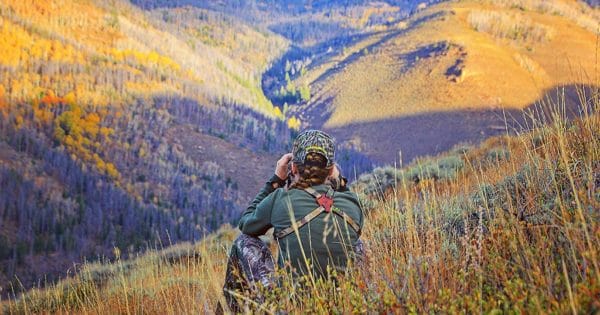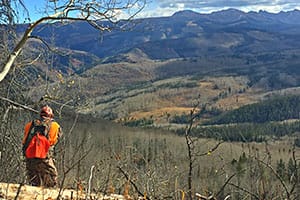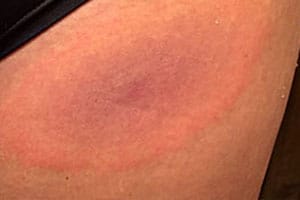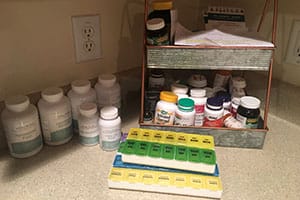
There it is—my alarm waking me before the sun has risen. I pry my eyes open, groggy and a bit confused, but then I remember where I am. I’m camped at 9,500 feet with my dad, uncles and cousins in the Rocky Mountains. Any pain I feel this morning is pushed aside as I rush to get my hunting clothes on and grab my gear.
As we drive the truck up the dark mountain, my anticipation builds along with extreme nausea and dizziness for no known reason. I try to block it out of my mind, as I have far more important things to focus on.
Finally, we reach our stop and begin our trek deeper into elk country. “Yikes! Even going downhill is hurting my muscles a lot,” I think. “Focus… focus!”
 Dad leads the way as I push myself to keep up, following closely behind. He is the expert, and I am the novice, imitating his every move. This was what I had been dreaming of since I was a little girl. It was finally my year to be in elk camp with a tag of my very own, and to top it off, I was blessed with the best guide I could ever want.
Dad leads the way as I push myself to keep up, following closely behind. He is the expert, and I am the novice, imitating his every move. This was what I had been dreaming of since I was a little girl. It was finally my year to be in elk camp with a tag of my very own, and to top it off, I was blessed with the best guide I could ever want.
We walked and walked, tip toeing through patches of woods to peek into the meadows, hoping to catch some elk feeding. Something still doesn’t feel right. My neck feels like someone put their toughest boots on and stomped on it, my lower back is tight and aching, my feet are throbbing, my head is pounding, I’m nauseous, my heart feels like it might explode, and I feel like I haven’t slept in weeks.
“Focus Courtney!” I scream in my head, afraid to admit how bad I feel.
The first day of the elk hunt is over, and we return to camp with an un-punched tag. My dad is still in good spirits, but I can’t help but realize my body is deteriorating more with each day of the hunt, each mile hiked, and my chance of punching my elk tag this year is deteriorating with it.
I go back to my tent and pray to God that He will give me the strength and endurance to continue on this week long hunt and that I might be blessed with my first elk.
The Answers to All My Questions…
I returned to Minnesota with no elk meat for my family that year. Miraculously, I survived two weeks in the Colorado backcountry with a group of men who had never had a woman in their elk camp before. That, in itself, was a huge blessing. I also managed to keep up with my dad, who is as healthy as a horse, covering more than seven miles together on the last day of the season. No one would have realized the condition I was in unless I told them. I’ll share it with you in hopes that you never have to go through what I am fighting to this day.

With a fever of 103°F and severe pain and stiffness throughout her body, Miller was poked and prodded at the ER, but doctors couldn’t identify the problem.
About two and a half weeks prior to my first elk hunt with a tag, in September 2016, I was admitted to the emergency room due to a severe fever and excruciating pain in my neck, back, legs, jaw, head, etc. You name it, and it was killing me. They did a spinal tap and hooked me up to IV fluids but could not figure out why I had a fever or why I was in so much pain. They sent me home with more questions than answers.
I had experienced some ongoing symptoms prior to the ER visit. I was constantly sick with colds and coughs. I grew extremely tired and weak, having to take naps in my car on my lunch break, and fighting falling asleep at my desk. I started getting a throbbing pain in my head, and felt like I was stuck in a strange brain fog in the mornings. One of the scariest symptoms I experienced was fainting twice while alone in my apartment. The one time, I even collapsed into wooden doors and lost my vision for a bit, but not consciousness.
My body deteriorated to the point that my mom had to stay with me in my apartment and help me in and out of the bathtub and my bed (the only two places I really went). If I so much as sneezed, coughed, or yawned I would start crying from the pain in my head and jaw.
I had seen my primary doctor fairly early on, but she couldn’t figure out what was wrong with me. We did tons of blood work and tests but got no answers.

Fewer than 50% of patients with Lyme disease recall a rash.
Then it happened. I started to get discoloration on the top portion of my left thigh. Over a few days, it grew to several inches in length and felt hot to the touch. I also began getting bright red patches across my back and stomach.
Once my doctor saw the bullseye and disseminated red lesions, she said there was a good chance I had Lyme disease, especially given my outdoor lifestyle. Then I recalled finding a decent number of ticks on me while turkey and deer hunting that year.
I did all the blood tests for Lyme disease, and they came back negative. Yet after researching symptoms online, I was certain that’s what I had. My doctor put me on two weeks of doxycycline. That’s routine practice for doctors in typical health care system, but it’s not effective for everyone, even if you catch it early. Eventually, I was tested a second time for Lyme disease, and this time it came back positive.
A couple weeks after my ER visit, I convinced my family to let me go on my elk hunt. I was just over a week or so into my doxycycline treatment and slowly starting to feel more normal. I was determined I would be ready to roll by opening day of elk.

Miller and her dad chasing elk in the Rockies.
While I had many ups and downs physically throughout this hunt, I wasn’t consumed by pain the entire time. There were plenty of moments I pushed it out of my mind and enjoyed my time hunting with my dad and the other men in our camp. I learned that I am truly capable of overcoming many obstacles if I put my mind to it. My dad and I had many great moments on this trip that I wouldn’t trade for the world.
However, shortly after finishing my first round of doxycycline, all my symptoms returned, and with a vengeance. They put me on a second round of doxycycline, but this time, my symptoms started getting worse while I was still taking the medicine.
My primary physician later sent me to an infectious disease specialist, which was a complete waste of my time and money. The specialist confirmed I had Lyme disease but said the couple rounds of doxycycline were all they could do for me. She even said, “Maybe over time, it will just heal on its own.”
Unfortunately, Lyme disease can escalate into chronic Lyme disease if not treated early enough or properly, which is exactly what happened to me. Lyme disease is an epidemic issue in the United States and many other countries. It is difficult to test for and widely misunderstood by both medical professionals and insurance companies. This is why I’ve had such a difficult time finding the appropriate treatment that I can afford.

This isn’t even the HALF of it.
While the standard treatment for Lyme disease is 14-30 days of antibiotics, many times it is ineffective. Lyme spirochetes have the ability to “hide” from antibiotics, and standard treatments often only mask the disease rather than cure it.
This chronic disease has impacted my life in many ways. I used to be able to workout on a daily basis to get in shape for various hunting seasons. I boxed, lifted weights, did cardio, and more. Now, I resemble a couch potato much more than the girl I once was. Even hunting and fishing have become more of a challenge due to my lack of energy, sore muscles and other symptoms. Because of the way Lyme disease is classified, I’ve also spent thousands of dollars out of my own pocket to treat myself, with no guarantee of ever being symptom free again.
I experienced all the symptoms of early Lyme disease and the majority of the symptoms for chronic Lyme disease listed HERE, as well as light/sound sensitivity, tingling/numbness and shooting pains, night sweats, irritable bladder, exaggerated symptoms from alcohol and stomach/abdominal cramps.
An LDo published survey of over 3,000 patients with chronic Lyme disease found that patients suffer a worse quality of life than those with most other chronic illnesses, including congestive heart failure, diabetes, multiple sclerosis and arthritis. Doctors don’t agree about the cause of these ongoing symptoms, and the primary cause of this debate is flawed diagnostic testing. There is currently no test that can determine whether a patient has an active infection or whether the infection has been eradicated by treatment.
I’m 23 years old, and right now, my quality of life isn’t looking all that bright. If I’ve learned one thing from this journey, it’s that if I’m ever blessed to be healthy again, I will never take it for granted. I’ll also forever hold onto the memories from that first elk hunt with my dad, and pray to God that Lyme disease won’t make it my last.



